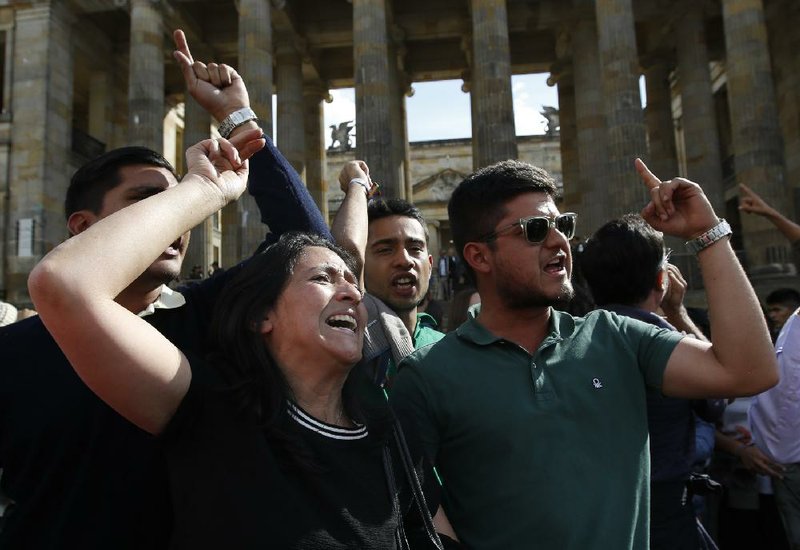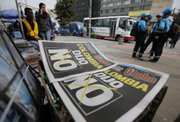BOGOTA, Colombia -- A referendum defeat for a peace deal with leftist rebels leaves Colombians with no Plan B to save an accord that sought to bring an end to a half-century of hostilities.
Instead of winning by an almost 2-to-1 margin on Sunday as pre-election polls had predicted, the accord with the Revolutionary Armed Forces of Colombia lost by a razor-thin margin, 49.8 percent to 50.2 percent.
Both President Juan Manuel Santos and leaders of the rebels, after four years of grueling negotiations, vowed to push ahead, giving no hint they want to resume a war that has already killed 220,000 people and displaced 8 million.
"I won't give up. I'll continue [to] search for peace until the last moment of my mandate," Santos said in a televised address Sunday.
And the guerrilla leader known as Timochenko released a short video message reiterating the group's willingness to abide by a permanent cease-fire, though he indicated no willingness to reopen the deal, saying the referendum vote has "no legal effect whatsoever."
He said the final accord had already been signed and deposited with the Swiss Federal Council in Bern as a special humanitarian agreement between warring parties under the Geneva Conventions.
But it's not clear how the already unpopular Santos and Revolutionary Armed Forces of Colombia leaders can save the deal. His chief negotiator, Humberto de la Calle, offered his resignation Monday, assuming what he called "complete responsibility" for the defeat.
It's unclear whether Santos will accept the offer or, as he previously announced, send him to Cuba with other negotiators to confer with the top leaders of the rebel group known as the FARC.
Santos quickly dispatched his negotiators to Cuba to try to salvage the accord. He also extended an olive branch to arch-rival former President Alvaro Uribe, inviting the hard-line conservative who led the opposition to the accord to join him in a bid to renegotiate and strengthen it.
"The FARC deeply regret that the destructive power of those who sow hatred and revenge have influenced the Colombian people's opinion," said Timochenko, the Revolutionary Armed Forces of Colombia's top commander.
The loss for the government was even more shocking considering the support for the accord among foreign leaders, who have heralded it as a model for a world beset by political violence and terrorism. Many heads of state as well as U.N. Secretary-General Ban Ki-moon and U.S. Secretary of State John Kerry were present when Santos and Timochenko signed the deal last week in a ceremony in the historic city of Cartagena.
"In Cartagena, I witnessed the profound desire of the Colombian people to end the violence," Ban told reporters in Geneva, adding that he urgently dispatched his representative to the peace talks to Cuba for consultations. "I count on them to press ahead until they achieve secure and lasting peace."
U.S. State Department spokesman John Kirby also expressed backing for Santos' plan for "a broad dialogue" in the search for peace.
"Colombians have expressed their commitment to settle their differences through institutions and dialogue rather than violence," he said.
Noting that "democracy can be messy at times," White House spokesman Josh Earnest said Sunday's referendum "might be the latest example of that."
"The good news is that all sides, including the voters, I think are still focused on trying to reach this negotiated peace," he said.
But the rebels' ambition, enshrined in a 297-page document that would have allowed them to avoid prison and form a political movement with seats in Congress, is now at risk. As part of the deal, rebels who confess their crimes to special peace tribunals were to be spared prison sentences and instead perform development work in areas hard-hit by the conflict.
In the absence of flexibility from the guerrillas, Santos' options are few: He could ratify the accord in congress, taking the unpopular step of disavowing the referendum's results, or call a constitutional convention, which might hand even more leverage to the guerrillas.
Santos and Uribe named three representatives each on Monday to initiate a dialogue seeking consensus on a way forward. Uribe also proposed granting an immediate amnesty for rank-and-file rebels who committed crimes, such as rebellion, that don't constitute serious human-rights violations.
"We'll have to act quickly and put deadlines because the uncertainty and lack of clarity about what's going to happen put at risk all that has been built so far," Santos said in a televised address Monday night.
Information for this article was contributed by Michael Weissenstein and Matti Huuhtanen of The Associated Press.
A Section on 10/04/2016

